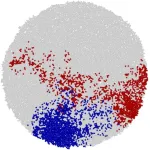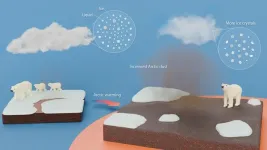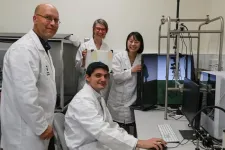(Press-News.org) UNDER STRICT EMBARGO UNTIL 10.00AM (UK TIME) ON 26 NOVEMBER 2024
New study reveals genetic drivers of early onset type 2 diabetes in South Asians
Peer reviewed | Observational study | People
A genetic predisposition to having lower insulin production and less healthy fat distribution are major causes of early-onset type 2 diabetes in British Asian people. According to new research from Queen Mary University of London, these genetic factors also lead to quicker development of health complications, earlier need for insulin treatment, and a weaker response to some medications.
The findings, published today in Nature Medicine, reinforce the need to understand how genetic variation across different population groups can influence the onset of diseases, treatment responses, and disease progression.
Queen Mary researchers used data from the Genes & Health cohort, a community-based study of more than 60,000 British-Bangladeshi and British-Pakistani volunteers who have generously provided their DNA for genetic research. The researchers securely linked genetic information to NHS health records in 9,771 Genes & Health volunteers with a type 2 diabetes diagnosis and 34,073 diabetes-free controls to understand why South Asians develop type 2 diabetes at a younger age and often with normal body mass index, compared to white Europeans.
In contrast to previous studies which included very few people of South Asian heritage, this research used partitioned polygenic scores (pPS) to reveal the underlying genetic signatures causing type 2 diabetes specifically in people with South Asian ancestry.
Key discoveries from the study include:
Genetic signatures in south Asians: The younger age of onset in South Asians is strongly linked to genetic signatures that lead to both lower insulin production and unfavourable patterns of body fat distribution and obesity. The most significant genetic signature influencing whether a South Asian person develops type 2 diabetes, and at a young age, is a reduced ability of pancreatic beta cells to produce insulin. This genetic signature also increases the risk of gestational diabetes and the progression of gestational diabetes to type 2 diabetes after pregnancy.
Treatment responses: The genetic signatures identified in the study provide vital clues about how different people may respond to type 2 diabetes treatments. For example, individuals with high genetic risk for low insulin production were less likely to respond to common medications such as sodium-glucose co-transporter 2 inhibitors and were more likely to require insulin therapy.
High genetic-risk group identified: The study identified a subset of people with extreme genetic signatures for both low insulin production and unfavourable fat distribution. These individuals were found to develop type 2 diabetes an average of 8 years earlier and at lower body mass index. Over time, these individuals were more likely to need insulin treatment and were at higher risk for diabetes complications such as eye and kidney disease.
Sarah Finer, Clinical Professor in Diabetes Honorary Consultant in Diabetes at Queen Mary University of London, said: “Thanks to the participation of so many British Bangladeshi and British Pakistani volunteers in Genes & Health, we have found important clues as to why type 2 diabetes may develop in young, slim individuals. This work also tells us how important it is to move away from a “one-size-fits-all” approach to managing type 2 diabetes, and we hope that this will allow us to find ways to offer more precise treatments that treat the condition more effectively and reduces the development of diabetes complications.”
Dr Moneeza K. Siddiqui, Lecturer in Genetic Epidemiology at Queen Mary University of London, said: “We don’t yet know whether genetic tools will be needed to deliver precision diabetes medicine in south Asian populations, or whether we can better and more widely use existing laboratory tests such as C-peptide which can be measured in a simple blood test. Genes & Health will contribute to future efforts to ensure that precision medicine approaches are developed and bring real benefits to south Asian communities living with, and at risk of, type 2 diabetes.”
People with South Asian heritage are underrepresented in genetic studies. Queen Mary’s Genes & Health is a community-based cohort of more than 60,000 British-Bangladeshi and British-Pakistani volunteers who have provided their genetic information and linkage to NHS health data for research. The study has so far led to major discoveries that improve the health outcomes of British South Asians.
This research was supported by Barts Charity and Wellcome.
ENDS
NOTES TO EDITORS
Contact
Sophia Prout
Faculty Communications Manager – Medicine and Dentistry
Queen Mary University of London
Email: s.prout@qmul.ac.uk or press@qmul.ac.uk
Honey Lucas
Faculty Communications Officer – Medicine and Dentistry
Queen Mary University of London
Email: h.lucas@qmul.ac.uk or press@qmul.ac.uk
Paper details:
Sam Hodgson et al, “Genetic basis of early onset and progression of type 2 diabetes in south Asians”. Nature Medicine.
DOI: 10.1038/s41591-024-03317-8
Under strict embargo until 26 November 2024 at 10:00 (London time), 26 November 2024 at 05:00 (US Eastern Time)
Available after publication at: https://www.nature.com/articles/s41591-024-03317-8
A copy of the paper is available upon request.
Conflicts of interest: None declared.
Funded by: Supported by Barts Charity and Wellcome.
About Queen Mary University of London
www.qmul.ac.uk
At Queen Mary University of London, we believe that a diversity of ideas helps us achieve the previously unthinkable.
Throughout our history, we’ve fostered social justice and improved lives through academic excellence. And we continue to live and breathe this spirit today, not because it’s simply ‘the right thing to do’ but for what it helps us achieve and the intellectual brilliance it delivers.
Our reformer heritage informs our conviction that great ideas can and should come from anywhere. It’s an approach that has brought results across the globe, from the communities of east London to the favelas of Rio de Janeiro.
We continue to embrace diversity of thought and opinion in everything we do, in the belief that when views collide, disciplines interact, and perspectives intersect, truly original thought takes form.
About Genes & Health
https://www.genesandhealth.org/
Genes & Health is one of the world’s largest community-based genetics research programmes, focusing on improving health outcomes for British Bangladeshi and British Pakistani communities through ground-breaking scientific discovery.
About Barts Charity
Barts Charity brings brilliant ideas, ground-breaking research and transformational healthcare to life in East London. Together with our partners, we make better healthcare possible, funding brilliant ideas and ground-breaking research to transform lives.
As the dedicated charity for Barts Health NHS Trust, we support St Bartholomew’s, Whipps Cross, Newham, Royal London, and Mile End hospitals, as well as the Faculty of Medicine and Dentistry at Queen Mary University of London. We also support researchers at the School of Health & Psychological Sciences at City, University of London. Visit https://www.bartscharity.org.uk
About Wellcome
Wellcome supports science to solve the urgent health challenges facing everyone. We support discovery research into life, health and wellbeing, and we’re taking on three worldwide health challenges: mental health, infectious disease and climate and health.
END
New study reveals genetic drivers of early onset type 2 diabetes in South Asians
2024-11-26
ELSE PRESS RELEASES FROM THIS DATE:
Delay and pay: Tipping point costs quadruple after waiting
2024-11-26
RICHLAND, Wash. —Tip the first tile in a line of dominoes and you’ll set off a chain reaction, one tile falling after another. Cross a tipping point in the climate system and, similarly, you might spark a cascading set of consequences like hastened warming, rising sea levels and increasingly extreme weather.
It turns out there’s more to weigh than catastrophic environmental change as tipping points draw near, though. Another point to consider, a new study reveals, is the cost of undoing the damage.
The cost of reversing the effects of climate change—restoring melted polar sea ice, for ...
Magnetic tornado is stirring up the haze at Jupiter's poles
2024-11-26
While Jupiter's Great Red Spot has been a constant feature of the planet for centuries, University of California, Berkeley, astronomers have discovered equally large spots at the planet's north and south poles that appear and disappear seemingly at random.
The Earth-size ovals, which are visible only at ultraviolet wavelengths, are embedded in layers of stratospheric haze that cap the planet's poles. The dark ovals, when seen, are almost always located just below the bright auroral zones at each ...
Cancers grow uniformly throughout their mass
2024-11-26
Researchers at the University of Cologne and the Centre for Genomic Regulation (CRG) in Barcelona have discovered that cancer grows uniformly throughout its mass, rather than at the outer edges. The work, published today in the journal eLIFE, challenges decades-old assumptions about how the disease grows and spreads.
“We challenge the idea that a tumour is a ‘two-speed’ entity with rapidly dividing cells on the surface and slower activity in the core. Instead, we show they are uniformly growing masses, where every region is equally active and has the potential ...
Researchers show complex relationship between Arctic warming and Arctic dust
2024-11-26
The Arctic is warming two to four times faster than the global average. A recent study by researchers in Japan found that dust from snow- and ice-free areas of the Arctic may be an important contributor to climate change in the region. The findings were published in the journal npj Climate and Atmospheric Science.
According to one view, higher temperatures in the Arctic are thought to lead to the region's clouds containing more liquid droplets and fewer ice crystals. Clouds become thicker, longer lasting, ...
Brain test shows that crabs process pain
2024-11-26
Researchers from the University of Gothenburg are the first to prove that painful stimuli are sent to the brain of shore crabs providing more evidence for pain in crustaceans. EEG style measurements show clear neural reactions in the crustacean's brain during mechanical or chemical stimulation.
In the search for a better welfare of animals that we humans kill for food, researchers at the University of Gothenburg have chosen to focus on decapod crustaceans. This includes shellfish delicacies such as prawns, lobsters, crabs and crayfish that we both catch wild and farm. Currently, ...
Social fish with low status are so stressed out it impacts their brains
2024-11-26
Social stress is bad for your brain. It’s a prime suspect in the accumulation of oxidative stress in the brain, which is believed to contribute to mental health and neurodegenerative disorders — but the mechanisms that turn social stress into oxidative stress, and how social status affects this, are poorly understood. By studying a highly social, very hierarchical fish species, cichlids, scientists have now found that social stress raises oxidative stress in the brains of low-status fish.
“We found that low rank was generally linked to higher levels of oxidative stress in the brain,” said Dr Peter Dijkstra of ...
Predicting the weather: New meteorology estimation method aids building efficiency
2024-11-26
Due to the growing reality of global warming and climate change, there is increasing uncertainty around meteorological conditions used in energy assessments of buildings. Existing methods for generating meteorological data do not adequately handle the interdependence of meteorological elements, such as solar radiation, air temperature, and absolute humidity, which are important for calculating energy usage and efficiency.
To address this challenge, a research team at Osaka Metropolitan University’s Graduate School of Human Life and Ecology—comprising Associate ...
Inside the ‘swat team’ – how insects react to virtual reality gaming
2024-11-26
Humans get a real buzz from the virtual world of gaming and augmented reality but now scientists have trialled the use of these new-age technologies on small animals, to test the reactions of tiny hoverflies and even crabs.
In a bid to comprehend the aerodynamic powers of flying insects and other little-understood animal behaviours, the Flinders University-led study is gaining new perspectives on how invertebrates respond to, interact with and navigate virtual ‘worlds’ created by advanced entertainment technology.
Published in the ...
Oil spill still contaminating sensitive Mauritius mangroves three years on
2024-11-26
Three years after bulk carrier MV Wakashio ran aground on a coral reef off Mauritius, spilling 1000 tonnes of a new type of marine fuel oil, Curtin University-led research has confirmed the oil is still present in an environmentally sensitive mangrove forest close to important Ramsar conservation sites.
Lead researcher Dr Alan Scarlett, from Curtin’s WA Organic and Isotope Geochemistry Centre in the School of Earth and Planetary Sciences, said the chemical ‘fingerprint’ of the oil found ...
Unmasking the voices of experience in healthcare studies
2024-11-26
Researchers are calling for a formal process that recognises and acknowledges the invaluable contributions of those with lived experience in healthcare research.
New research by Flinders University published in the Patient Education and Counselling journal exposes underlying issues in academic engagement and calls for better processes to credit those with lived experiences.
“With the growing awareness of the importance of diversity and inclusion in research, it is time for the research community to monitor not only how often, but also how well people with lived experience are involved,” says Associate Professor Elizabeth Lynch.
Associate Professor Lynch from the College of ...






